Home › University › How To Write A Personal Statement? 10 Tips + Student Questions Answered › How To Start A Personal Statement: Tips & Examples

How To Start A Personal Statement: Tips & Examples
- Published January 20, 2023

We’re regularly asked the question “ how to start a personal statement ”? It’s a challenging task for anybody but worry not as we’re here to help guide you through the process.
The introduction is the first thing the admissions committee will read. That’s why the first sentence of a personal statement should be a catchy, attention-grabbing hook or story that grabs the reader’s attention and sets up the main point of your essay.
A lacklustre introduction may lose your readers’ interest, preventing them from reading the rest of your personal statement!
But don’t worry, this article will guide you on writing a personal statement introduction, a few examples of opening sentences and how to captivate the admissions tutors. Without further ado, let’s get started.
Top Tip: Leave Your Introduction For Last
You know what they say, the hardest thing to do is start . So skip the introduction for now and focus on the main body of your personal statement. If you’re not sure what your main content should be, read out how to write a personal statement guide.
After nailing down the main points, you’ll have a concrete idea of how your introduction can captivate the reader and stay relevant to the bulk of the writing. Go ahead and work on the rest of your personal statement.
Come back when you’re finished! And if you’re worried about your conclusion then check out our advice on personal statement conclusions .
2. Cut To The Chase
You only have 4,000 characters to sell yourself as an ideal student candidate. Make each character and paragraph count! That means forget about flowery words and directionless statements. When you start your personal statement, explain your motivations for choosing your course in one or two sentences.
Although you will discuss this in-depth in the main body of content, capturing your reader’s attention with a quick overview of why you’re enthusiastic about your chosen course is crucial. That’s why capturing the reader’s attention by jumping straight to the point is key to starting a personal statement.

3. Be Specific
Never give vague details when expressing why you want to pursue your course. “I always wanted to be an engineer since I was a kid,” or “I want to become a doctor because I enjoy science” isn’t advised.
On that note, if you’re applying to medicine refer to our guide on how to write a medical personal statement . We suggest being more specific than that, and you can include your academic achievements too. Here are a few suggestions that may help you:
- You witnessed an inspirational figure in your life solve a massive problem with a specific skill set (doctor, engineer, etc.)
- While you were at a charity event, you encountered a problem that kept people in deprivation. By pursuing this course, you’re a part of the solution.
- You’re good at, and you enjoy a specific skill set. The course you’re eyeing puts great emphasis on this particular skill.
- There was a moment in your life when you succeeded in solving a problem. You felt significant by doing so, and you want to keep doing that for the rest of your life (teaching poor children how to read)
- You watched a movie or read a book that ignited your passion for the course. After doing volunteer work or part-time employment related to your course, you’re determined to pursue it.
Craft a sentence or two that encapsulates the core of your “why.” Do this, and your reader will want to read more!
4. Demonstrate Knowledge In Your Chosen Course
An essential element of starting a personal statement is to express why you’re enthusiastic about taking your chosen course. You need to demonstrate that you’re aware of what you’re getting yourself into in the process. Answer any of these prompt questions for inspiration:
- What do you find interesting about the course?
- How do you believe the course will help you achieve your goals?
- How will you use your chosen course to contribute to society?
- What hurdles do you expect to encounter, and how will you handle them?
Decide which of these questions fits best into the main content of your personal statement . Write your answer in a sentence or two, weave them into your application essay and think about the help you received from your tutors in the past.
5. Ditch The “Since I Was A Child” Line
We’re often asked what not to put in a personal statement and “Since I was a child” is a cliche statement that gets thrown around haphazardly. How many students have said this at least once in their personal statements?
Recalling your childhood passions is a weak “why” for pursuing your course. Why? Because the admissions committee is looking for a relevant and up-to-date reason.
When you were little, you had zero knowledge and little enthusiasm to become successful in your field. You had no idea what skillsets you needed or what other options were available to you.
But if you were to cite a recent event in your life that supports your determination to pursue your course, that screams “educated choice” right there. And that is what the admission committee is looking for after reading hundreds, if not thousands of introductions.
6. Brainstorm Several Versions Of Your Opening Lines
The desire to get it right the first time paralyses you from starting. So permit yourself to write freely. Write as many versions of your opening lines as possible.
Don’t worry about the grammar, spelling, or character count just yet. Type everything that goes off the top of your head. When you’re done, take a look at your list.
Cross out the ones you dislike, and encircle the ones you think have potential. Then start piecing the puzzle pieces together to check out if the intro lines fit with the rest of your personal statement.
If you’ve found three potential opening statements, try reading them aloud together with the rest of your personal statement. Do they flow seamlessly into one another? Make the necessary adjustments. Play around with it until you feel you’ve hit the spot.
7. Make Your Opening Statement Error Free
Your opening statement is your hook line. Spelling or grammatical errors at the start discourage your reader from reading further. If you have errors at the beginning, you’ll most likely have them in your main content!
So make sure your English is simple, flawless, and straightforward. Run your personal statement through a tool like Grammarly to weed out most of the errors.
The Hemingway app is also a helpful tool for checking for passive voice and other writing problems. Take advantage of writing assistant tools, especially if you’re a non-native English writer.
8. Read Examples Of Personal Statements
Read as many personal statement examples as you can. Any that captivated you, keep them in your notes. Figure out why these statements stood out to you compared to the others. What elements can you place in your personal statement?
When reading personal statements that put you off, find out why. What characteristics do they have that elicit a negative reaction from you? List them down, and make sure you avoid them.
After this exercise, you should have a few more ideas about your personal statement introduction.
9. Ask For Feedback
Never underestimate what feedback can give you. Ask your family, friends, and acquaintances about your opening statement. Does your personality shine through? Is it straight to the point? Does it flow smoothly with the main content of your personal statement?
Listen to what they have to say. Jot down important points. You’ll need their feedback to get a second opinion on whether it works for you or not.
10. Give Yourself Time
Your chosen career depends on your college education. And a first crucial step is to convince the admission committee you’re worth accepting into your university. You have to give your personal statement your best shot. Give yourself enough time to brainstorm and think everything over.
You can’t finish a complete, well-written personal statement in a week. Much less overnight!
So make sure you set aside enough time to put your best foot forward. After finishing a complete draft of your personal statement, put it down. Forget about it for a few days. Then come back and reread it.
With a fresh set of eyes, you’ll notice details you may not have seen before! Revise as much as you need.
Do I Need To Write An Introduction For A Personal Statement?
Yes, we recommend writing an introduction for your personal statement as it provides context to the rest of your writing. The introduction is an opportunity to make a good first impression and capture the university admissions officer’s attention.
What is a good opening sentence for a personal statement?
Here are some examples of a good opening sentence for a captivating introduction. Note how it ties into the university degree almost straight away with first-hand experience:
- “Growing up in a small town with limited resources sparked my curiosity and drive to pursue higher education and make a positive impact in my community.”
- “From a young age, I have been fascinated by the intricacies of the human mind and the power of psychology to improve people’s lives.”
- “As a first-generation college student, I am determined to break barriers and pave the way for future generations through a career in law.”
- “My passion for sustainable design was ignited by a volunteer trip to a developing country, where I witnessed the devastating effects of environmental degradation firsthand.”
- “A chance encounter with a blind person and their guide dog inspired me to pursue a career in veterinary medicine, with the goal of improving the lives of animals and their human companions.”
Please do NOT use these in your personal statements, use these to guide you on how you want to start your personal statement.
Can You Open Your Personal Statement With A Quote?
It is a risky move to open your personal statement with a quote and can come across as clichéd or insincere to the university admission officers. However, there are rare occasions when it can work, just make sure the quote relates to your degree and experience you’re writing about.
Get Ready To Write Your Personal Statement
How does one start a captivating personal statement? Take the time to think about what makes an effective introduction.
Read examples of personal statements from other students to glean ideas for how yours might stand out. Once you have read through some good ones, they should be more than just two or three!–look closely at what elements made them so successful.
Then try applying those same principles on how to start a personal statement! Don’t forget to bookmark this post for future reference.
Real Alumni Stories
Learn more about our alumni through their success stories.
- Real stories about our Alumni
- Students share their programme experiences
- Case studies from Alumni heading to Oxbridge
- Alumni insights and stats
Empower Your Child's Future: Book Your Complimentary Consultation Now
- Receive tailored advice to match your child's interests and goals.
- Gain insights from our experienced programme consultants.
- Get answers in real-time, making your decision-making process smoother and more informed.

Join Succeed for free: unlock £50 off your Immerse programme*
Succeed is Immerse Education’s student success platform that empowers ambitious learners with tools, content, and interactive resources for university preparation and career exploration.
* Terms and Conditions apply
Download Our Prospectus

- I'm a Parent
- I'm a Student
- First Name *
- Last Name *
- Phone number *
- Which subjects interest you? (Optional) Architecture Artificial Intelligence Banking and Finance Biology Biotechnology Business Management Chemistry Coding Computer Science Creative Writing Criminology Economics Encryption and Cybersecurity Engineering English Literature Entrepreneurship Fashion and Design Female Future Leaders Film and Animation Fine and Digital Art Film Studies Global Society and Sustainability History International Relations Law Marketing and Entertainment Mathematics Medicine Medicine and Health Sciences Media and Journalism Nanotechnology Natural Sciences Philosophy Philosophy Politics and Economics Physics Psychology Software Development and AI Software Development and Gaming Veterinary Studies Online Research Programme
Secure priority enrolment for our new summer school location with a small refundable deposit.
" * " indicates required fields
Receive priority enrolment for new summer school locations by registering your interest below.
Our programme consultant will contact you to talk about your options.
- Family Name *
- Phone Number
- Yes. See Privacy Policy.
Subject is unavailable at location
You have selected a subject that is not available at the location that you have previously chosen.
The location filter has been reset, and you are now able to search for all the courses where we offer the subject.

Personal Statement
Ai generator.
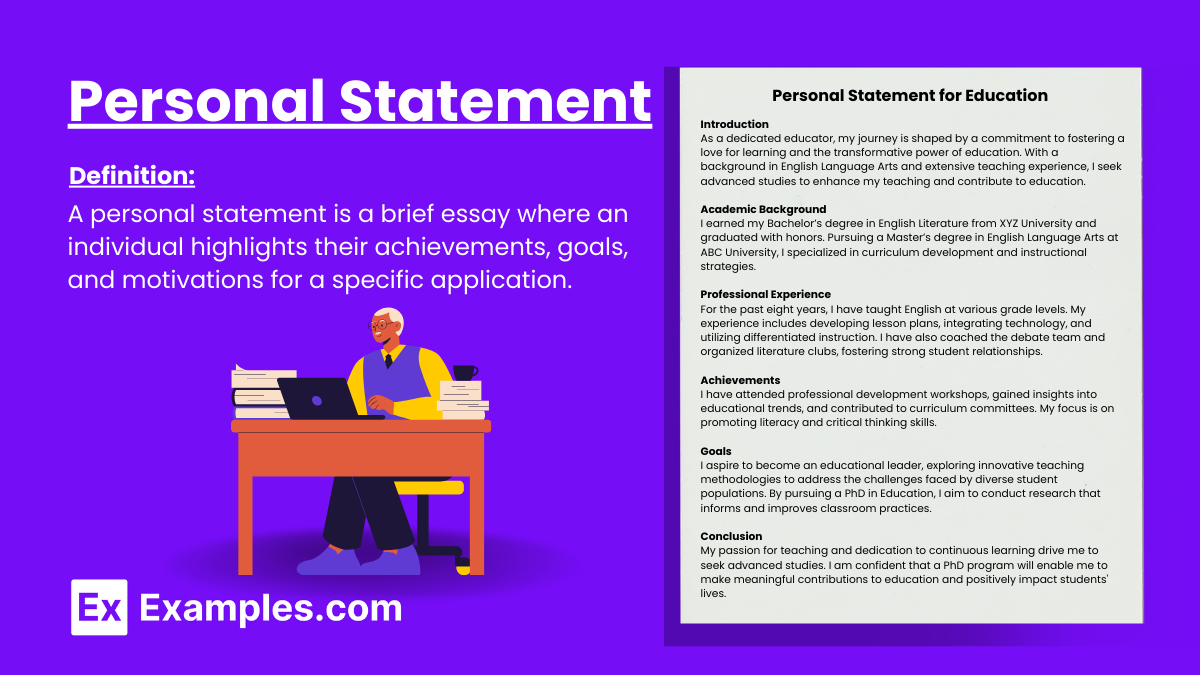
A personal statement is a vital component of college and job application . It showcases an individual’s unique experiences, skills , and aspirations, providing a narrative that highlights their strengths and goals. Crafting a compelling personal statement allows applicants to express their personality and motivations, helping them stand out in a competitive field. It’s an opportunity to reflect on past achievements and outline future ambitions, making a memorable impression on selection committees.
What Is a Personal Statement?
A personal statement is a crucial part of college and job applications, allowing individuals to highlight their unique experiences, skills, and aspirations. It serves as a narrative that showcases strengths and goals, helping applicants stand out. By reflecting on past achievements and outlining future ambitions, a well-crafted personal statement makes a lasting impression on selection committees.
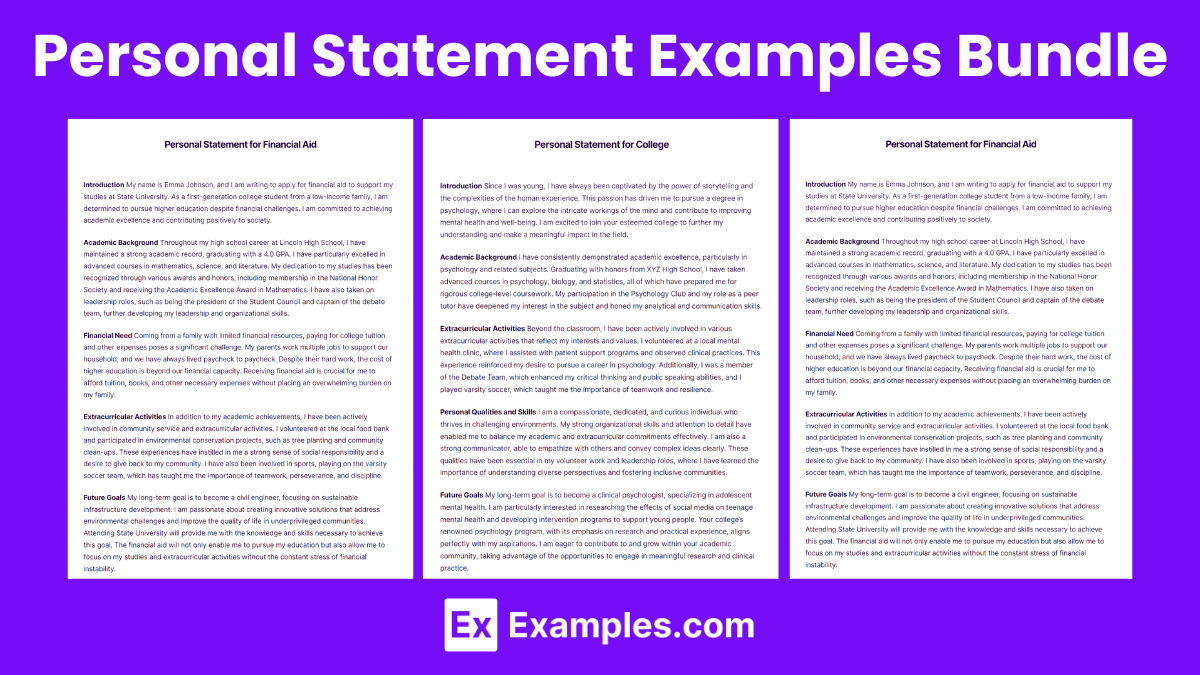
Download Personal Statement Bundle
Personal statement format
A personal statement is a crucial component of applications for college, graduate school, scholarships, or jobs. It is your opportunity to highlight your achievements, experiences, and goals. Here is a format for writing an effective personal statement:
- Begin with a strong opening sentence that grabs the reader’s attention.
- Introduce yourself and state the purpose of your personal statement.
- Mention what you are applying for (e.g., a specific program, scholarship, job).
- Discuss your academic achievements and experiences.
- Mention relevant courses, projects, or research that have prepared you for the program or job.
- Highlight any honors or awards you have received.
- Detail your work experience, internships, or volunteer work.
- Focus on experiences that are relevant to the program or position.
- Emphasize any skills or knowledge you have gained.
- Include any extracurricular activities, hobbies, or interests that demonstrate your well-rounded character.
- Mention leadership roles, community service, or other achievements.
- Show how these experiences have shaped you and your aspirations.
- Clearly state your short-term and long-term goals.
- Explain how the program or job aligns with your career aspirations.
- Describe what you hope to achieve and how you plan to contribute to the field.
- Summarize the key points you have made.
- Reiterate your enthusiasm and readiness for the program or position.
- Thank the reader for considering your application .
Example Personal Statement
Personal Statement for University Introduction : I am excited to apply for the Master’s program in Environmental Science at XYZ University. With a strong academic background in biology and a passion for environmental conservation, I am eager to contribute to cutting-edge research in sustainability and climate change mitigation. Academic Background : I graduated with honors from ABC University with a Bachelor’s degree in Biology. During my undergraduate studies, I completed a research project on the impact of urbanization on local wildlife, which sparked my interest in environmental science. I have taken courses in ecology, environmental policy, and data analysis, providing me with a solid foundation for advanced study. Professional Experience : Over the past two years, I have interned at the Green Earth Organization, where I assisted in conducting field surveys and analyzing data on endangered species. This experience has honed my skills in data collection, statistical analysis, and report writing. Additionally, I volunteered with Clean Water Initiative, where I led a team to organize community clean-up events and educate the public on water conservation. Personal Achievements and Extracurricular Activities : Outside of academics and professional work, I am an avid hiker and nature photographer. I have also been a member of the university’s environmental club, where I served as president and organized several successful campus-wide sustainability events. These activities have strengthened my leadership and teamwork skills. Goals and Aspirations : My short-term goal is to gain in-depth knowledge and research experience in environmental science through the Master’s program at XYZ University. In the long term, I aspire to work as an environmental consultant, helping businesses and communities implement sustainable practices. I am particularly interested in developing innovative solutions to reduce carbon footprints and protect natural habitats. Conclusion : In conclusion, I am confident that my academic background, professional experience, and passion for environmental conservation make me a strong candidate for the Master’s program in Environmental Science at XYZ University. I am eager to contribute to your esteemed program and am grateful for your consideration. Thank you for taking the time to review my application.
Personal Statement Examples
Personal statement for resume.
- Personal Statement for Job
Personal Statement for University
Personal statement for college, personal statement for financial aid.
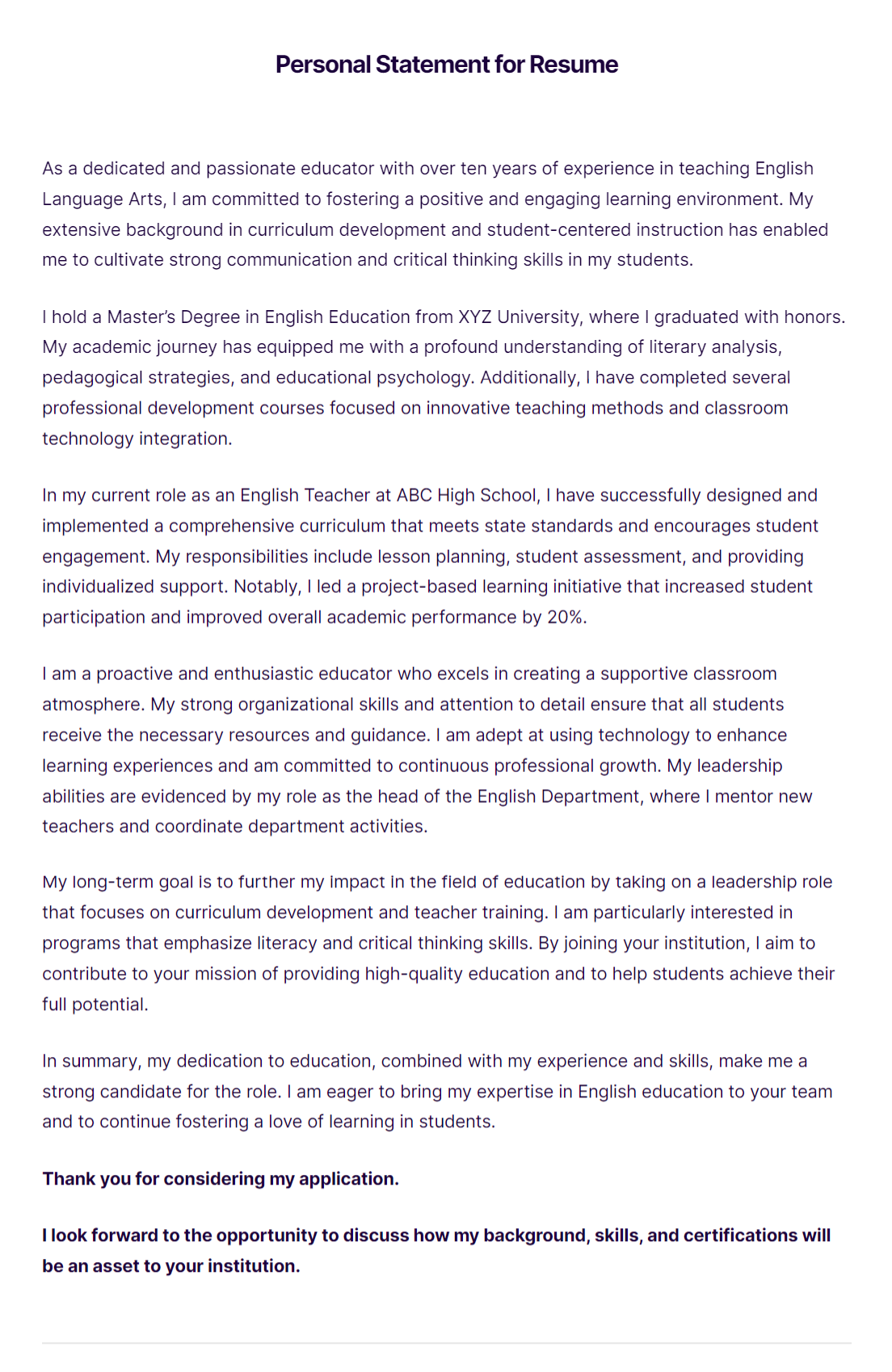
Personal Statement for Jobs
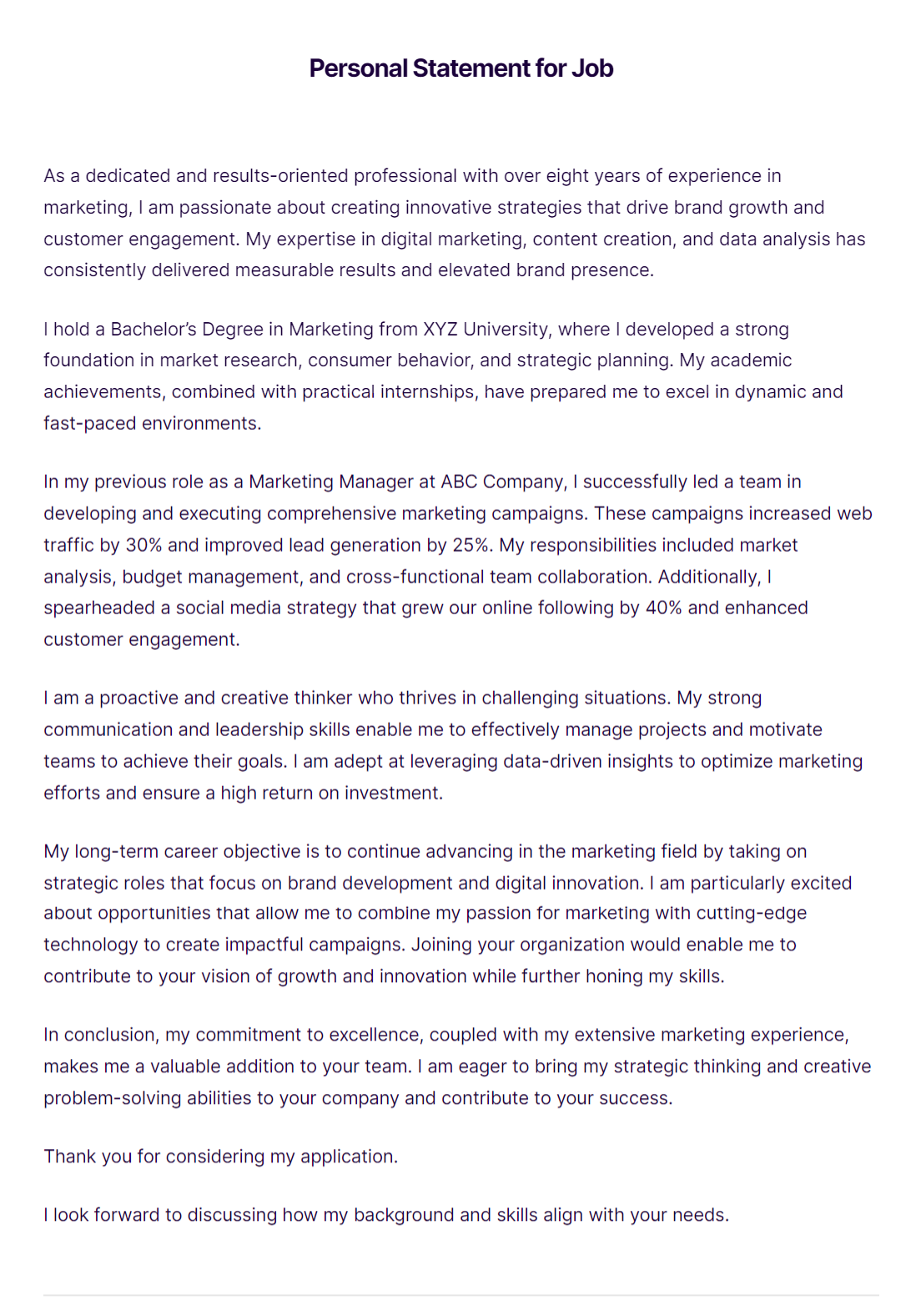
More Examples for Personal Statement
- Personal Statement Example for Medical School
- Personal Statement Example for Graduate School
- Personal Statement Example for Internship
- Personal Statement Example for Law School
- Personal Statement Example for CV
- personal statement Example for Research Internship
More Personal Statement Samples & Templates
1. personal statement affidavit template.
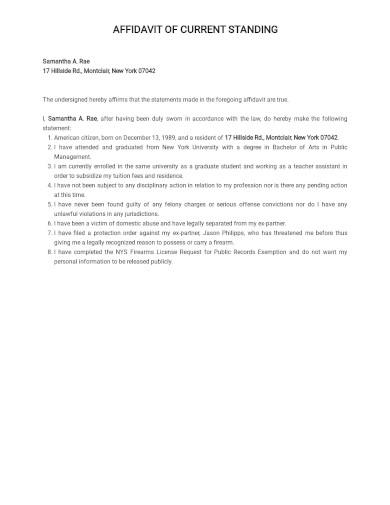
2. Freelance Personal Statement Template
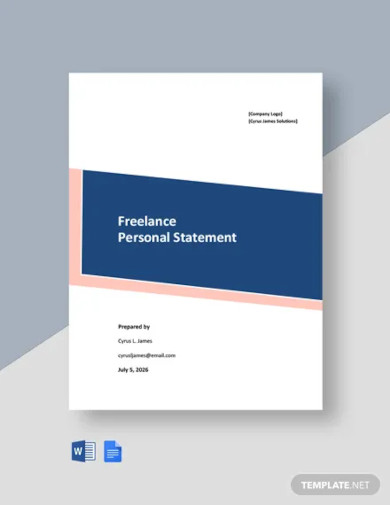
3. School Personal Statement Template
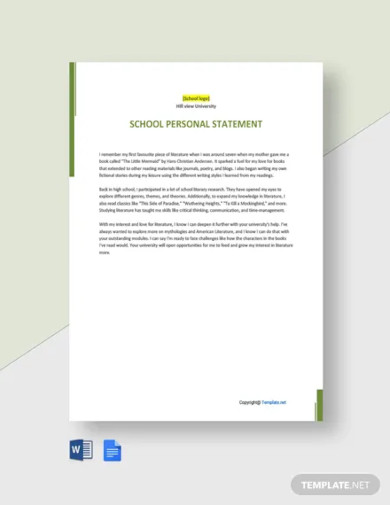
4. University Personal Statement Template
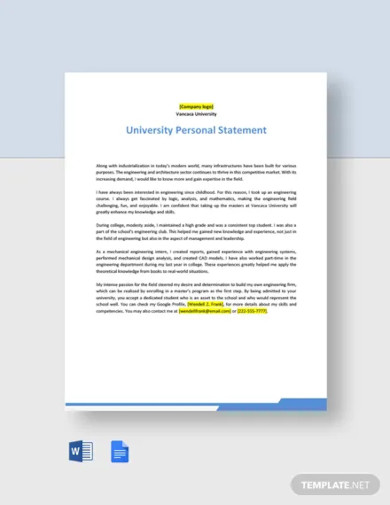
5. Medical School Personal Statement Template
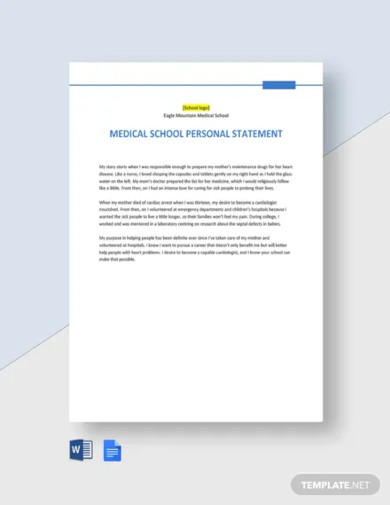

6. Law School Personal Statement Example
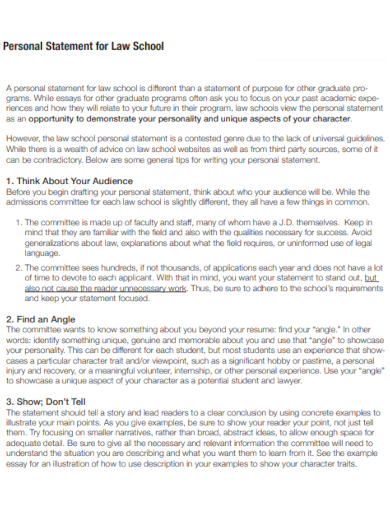
7. Engineering Master Personal Statement
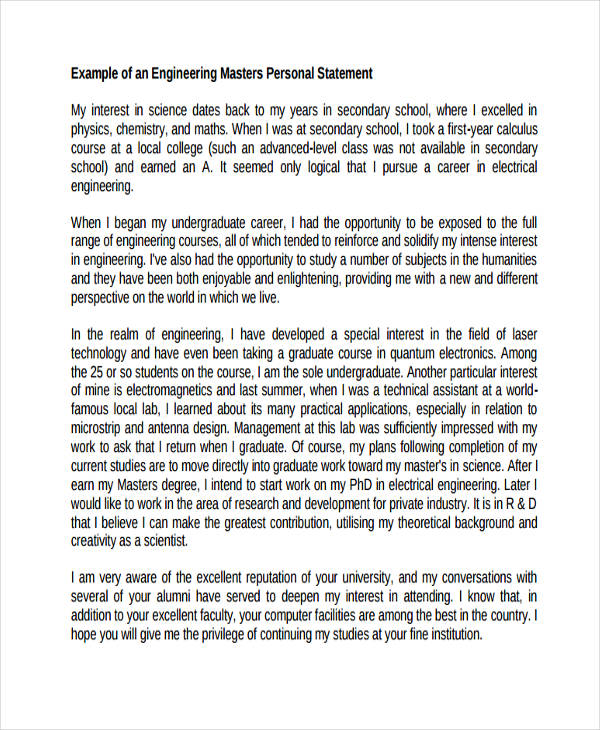
8. Civil Engineering Personal Statement
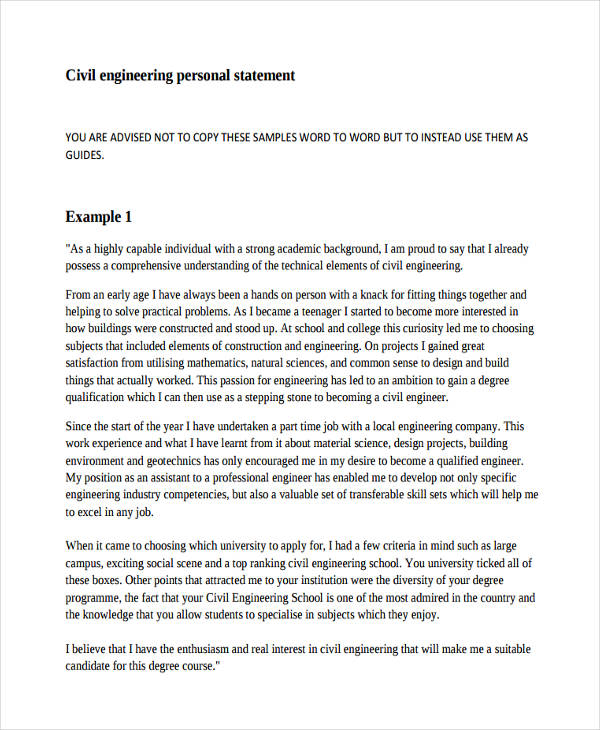
9. Mechanical Engineering Personal Statement
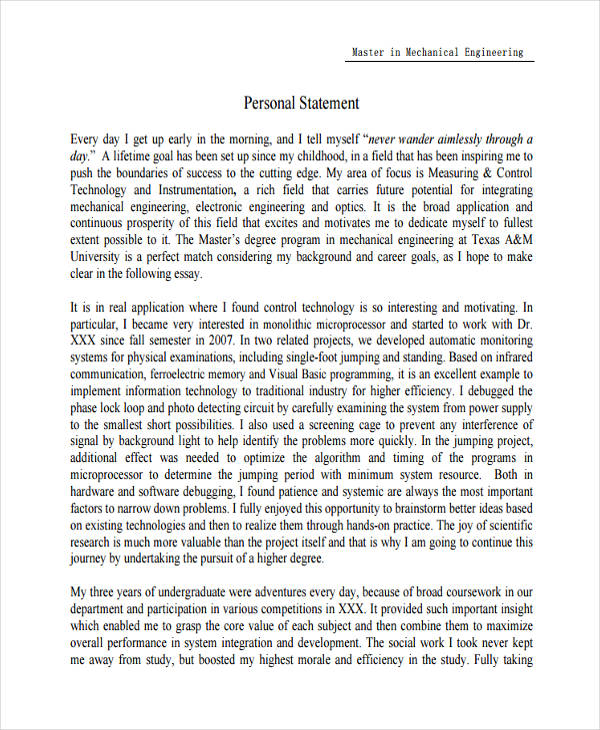
10. Law School Personal Statement
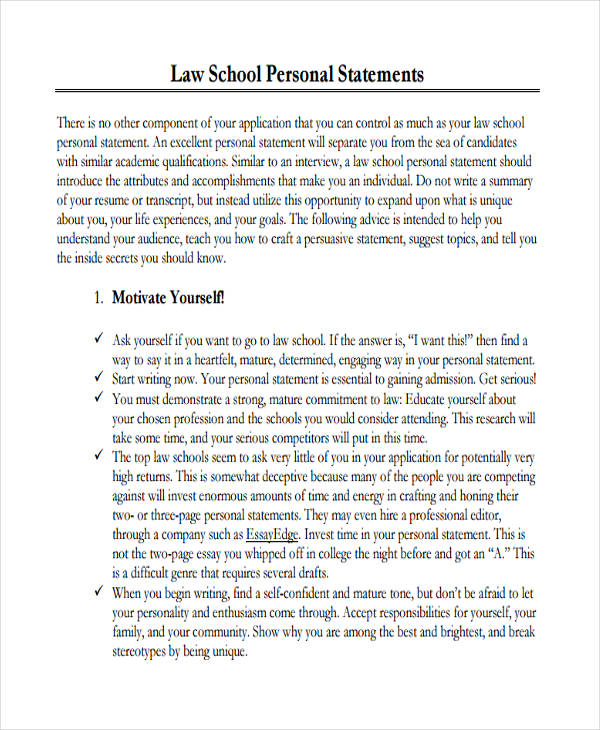
Tips for an Effective Personal Statement
When writing a personal statement, always bear in mind that you write to impress. So we have outlined for you some tips for an effective personal statement.
- Understand Your Goal. Bear in mind what your goal is in writing a personal statement . Remember that you are not the only one who is trying to grab that position or admission, so make it a point to put your best foot forward. This is what you do when you have a goal. It keeps your steps solid and for sure you won’t lose your track.
- Create an Outline. Like a college essay, your personal income statement should have a layout. Use the funneling technique on this one. Start from the most general points and narrow it down to the specific ones. It also helps you organize your thoughts better so your words will not jumble.
- Be Genuine. This is not the hardest thing to do in the world. All you need to do is tell honestly what your skills and accomplishments are. A personal statement is an overview about your personality. Even if it is a written letter, an employer or a supervisor will know if you are telling the truth or not.
- Be Specific. Some schools or business statement establishments would send a list of questions that they need you to answer and include on your personal statement. Answer those questions concretely and with substance. Do not veer away from your main point. Focus on your answer and be straightforward.
- Maintain a Positive Tone. A personal statement is not the place for you to vent out your frustrations in life nor an opportunity to show your weaknesses and appeal for emotions. Make your words sound positive. Provide energy and liveliness when sharing about a certain lesson you learned or an obstacle in your life and how you were able to overcome it.
- Check and Revise. Sometimes when we are writing, we often misspell things or use inappropriate words especially when we are in our deep thoughts. So before you put your letter in an envelope and put it in your mailbox, be sure to proofread your work. Check your spelling, choice of words and arrangement of thoughts.
How Important Is a Personal Statement?
University admissions hold interviews based on the applications they receive. How you write your personal vision statement will be a determining factor for you to land in an interview and consequently get into college. So if you are planning to write a personal letter of poor quality, you better think twice. Here are the reasons why you need to write a compelling personal letter.
1. It gives you a better shot.
Whether you are aiming for a university admission or landing a job at a prominent income statement for company , an effective personal letter gives you a better shot compared to others. Remember that you are not the only participant in the race. In order for you to win, you need to give it with an undivided attention.
2. It gets your name on the list.
Yes, it does. The truth is your personal letter is your only key to have your name on the master list. Some universities are a little picky when it comes to admitting new applicants. They do filtering to ensure that they choose the right students for the right program. Not only that. They are very selective because the applicant they choose will soon become a fruit of their own tree and they certainly don’t want it to be a bad one.
3. It boosts your confidence.
A personal statement is always given a head of time during an application examples or admission process. This gives the school or a company an overview of who to select from the many applicants. Writing a bold and convincing personal letter could get you ahead of others. You get picked from the basket of people longing for that post. Then in the process you get called for an interview.
You know that your personal statement caught the attention of the school board or the employer and so you are confident that you are just a few steps away from landing that position you always hoped for.
A personal statement need not be a novel-long narrative of yourself. Just as long as the important words and details are there, that’s fine. However, never settle for less. Always aim for the best. Have you ever seen an advertising brochure?
It usually comes as a single sheet example in pdf , a cardboard or a photo paper maybe, folded into half or a quarter, but contains all the necessary information you want to know about a certain product. That is how your personal statement should be, brief, concise, and effective.
What should be included in a Personal Statement
A personal statement is a critical component of many applications, providing an opportunity to showcase your qualifications, experiences, and motivations. Here is a comprehensive guide on what should be included in a personal statement:
1. Introduction
- Compelling Opening : Start with an engaging story, quote, or anecdote to capture the reader’s attention.
- Brief Overview : Introduce yourself and state your purpose for writing the personal statement. Mention the program or position you are applying for.
2. Academic Background
- Educational Qualifications : Detail your academic achievements, including your degree(s), GPA, and any honors or awards.
- Relevant Coursework : Highlight specific courses that are pertinent to the program or role.
- Research Projects or Theses : Discuss any significant research projects, theses, or academic papers, emphasizing their relevance to your field.
3. Professional Experience
- Internships and Jobs : Describe your professional experiences, focusing on internships, jobs, or volunteer work that relate to your application.
- Responsibilities and Achievements : Outline your roles, responsibilities, and key accomplishments in these positions.
- Skills Gained : Highlight the skills and knowledge you acquired, and how they prepared you for the role or program.
4. Personal Qualities and Skills
- Key Attributes : Mention personal qualities that make you a strong candidate, such as dedication, motivation, and resilience.
- Technical and Soft Skills : List relevant technical skills (e.g., programming languages, lab techniques) and soft skills (e.g., leadership, communication).
5. Motivations
- Passion for the Field : Explain why you are passionate about the field or profession. Share any personal experiences or events that sparked your interest.
- Career Aspirations : Discuss your long-term career goals and how the program or role fits into your career plan.
6. Future Goals
- Short-term Objectives : Describe what you hope to achieve in the immediate future, such as completing a degree or gaining specific experience.
- Long-term Vision : Outline your long-term professional aspirations and how the program or role will help you achieve them.
7. Conclusion
- Recap Main Points : Summarize the key points of your statement, reinforcing your enthusiasm and readiness for the opportunity.
- Thank You : Express gratitude for considering your application and indicate your eagerness to discuss your application further.
How to Write a Personal Statement.
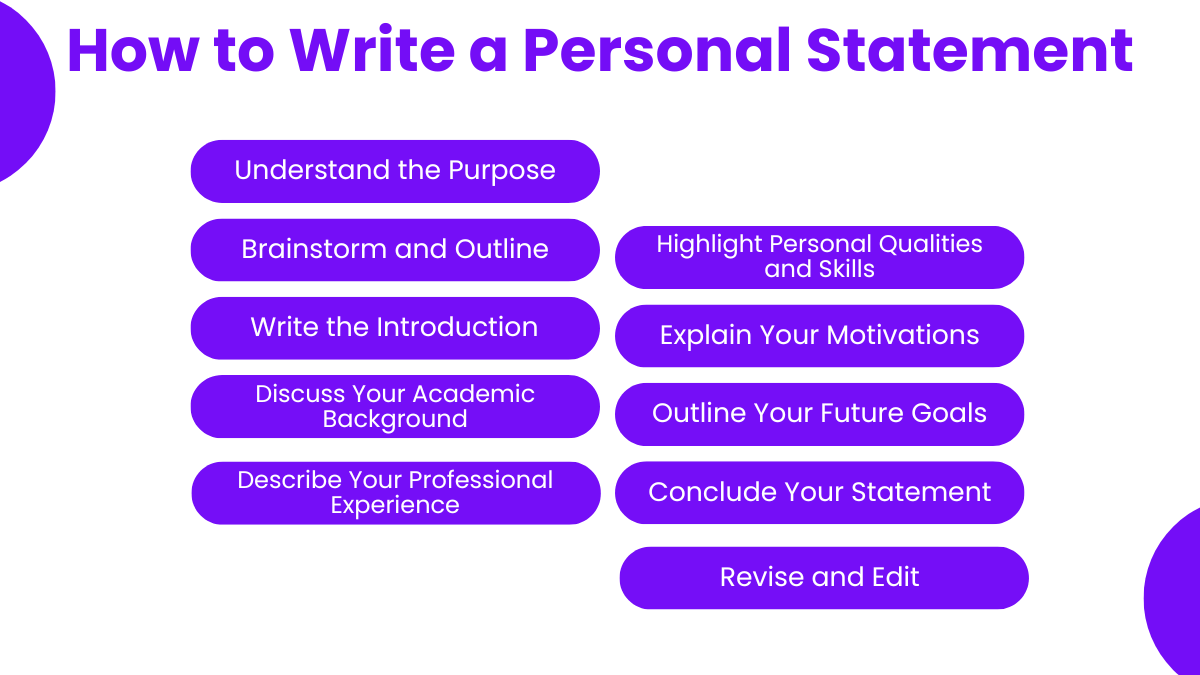
Writing a personal statement can be a challenging task, but it’s an essential part of many applications. Here’s a step-by-step guide to help you craft a compelling and effective personal statement:
Step 1: Understand the Purpose
- Purpose : A personal statement is a narrative that highlights your background, achievements, motivations, and goals. It aims to show why you are a suitable candidate for the program or position you are applying for.
- Audience : Consider who will be reading your statement and what they are looking for in a candidate. Tailor your content to meet their expectations.
Step 2: Brainstorm and Outline
- Self-Reflection : Think about your experiences, achievements, and goals. Identify key themes and stories that showcase your strengths and motivations.
- Outline : Create an outline to organize your thoughts. A typical personal statement includes an introduction, academic background, professional experience, personal qualities, motivations, future goals, and a conclusion.
Step 3: Write the Introduction
- Hook : Start with a compelling opening that grabs the reader’s attention. This could be a personal anecdote, a quote, or a unique experience related to your field.
- Overview : Briefly introduce yourself and state the purpose of your statement. Mention the program or position you are applying for.
Step 4: Discuss Your Academic Background
- Education : Detail your academic achievements, including your degree(s), GPA, and any honors or awards.
- Research Projects : Mention any significant research projects, theses, or academic papers, emphasizing their relevance to your field.
Step 5: Describe Your Professional Experience
Step 6: highlight personal qualities and skills, step 7: explain your motivations, step 8: outline your future goals, step 9: conclude your statement, step 10: revise and edit.
- Proofread : Carefully proofread your statement for grammar, spelling, and punctuation errors.
- Feedback : Seek feedback from mentors, professors, or colleagues to improve the clarity and impact of your statement.
- Polish : Make necessary revisions to ensure your statement is concise, coherent, and compelling.
What is a personal statement?
A personal statement is a written description of your achievements, skills, interests, and goals, typically used for university or job applications.
How long should a personal statement be?
Generally, a personal statement should be 500-800 words, but always check the specific guidelines of the application.
What should be included in a personal statement?
Include your introduction, academic background, professional experience, personal qualities, motivations, future goals, and conclusion.
How should I start my personal statement?
Start with a compelling hook, such as an anecdote, quote, or personal experience, to grab the reader’s attention.
How personal should my personal statement be?
Be personal enough to reflect your unique experiences and motivations but maintain a professional tone throughout.
Can I use the same personal statement for different applications?
Tailor each personal statement to the specific program or job to address their unique requirements and expectations.
Should I mention weaknesses in my personal statement?
If relevant, briefly mention weaknesses, but focus on how you have addressed and overcome them.
How do I make my personal statement stand out?
Highlight unique experiences, demonstrate passion for the field, and provide specific examples of your achievements and skills.
Is it okay to use quotes in a personal statement?
Yes, but use them sparingly and ensure they are relevant to your narrative and add value to your statement.
How do I conclude my personal statement?
Summarize your key points, reiterate your enthusiasm for the opportunity, and thank the reader for considering your application.
Text prompt
- Instructive
- Professional
10 Examples of Public speaking
20 Examples of Gas lighting

IMAGES
VIDEO
COMMENTS
A personal statement, also sometimes known as a professional statement or resume summary, is one of the most important documents you will write when applying to schools or jobs. An exceptional perso…
Get Ready To Write Your Personal Statement. How does one start a captivating personal statement? Take the time to think about what makes an effective introduction. Read …
Examples of personal statements. A good personal statement is unique to you, is about your particular experiences and ambitions and applies to the specific institution you're …
Explore the definition and types of a personal statement, discover how to write a good personal statement and review helpful tips with examples.
Step 3: Write the Introduction. Hook: Start with a compelling opening that grabs the reader’s attention. This could be a personal anecdote, a quote, or a unique experience related to your field. Overview: Briefly introduce …
The personal statement is your opportunity to talk about you, and why you want to enrol on a particular course. But how do you start it strongly? Read our advice below on what to include, what not to do, and how to approach it.
Writing your personal statement: carers, estranged students, refugees or asylum seekers. Everyone is individual, but certain life circumstances provide an opportunity to showcase the …